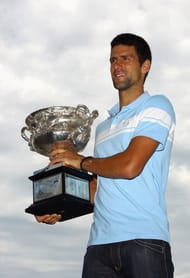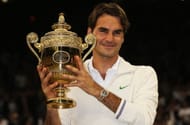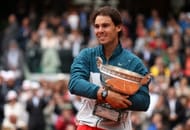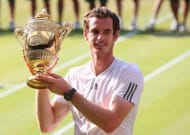Andy Murray of Great Britain, Novak Djokovic of Siberia, Roger Federer of Switzerland and Rafael Nadal of Spain
Rafael: The 2008 Olympic Gold medalist with a muscular physique and an equally powerful gameplay.
Federer: There is hardly a person to find who does not know who Roger Federer is.
Murray: The British blitz, who displays enough strength and power to defeat an opponent.
Djokovic: If anyone has matched Federer’s quality of shots in tennis, it is Novak Djokovic.
Even today, when you watch the dominant display by these present tennis greats, you will be in awe of the beauty of their gameplay. The Australian Open 2014 is just another means of establishing their brilliance.
Tennis is a beautiful sport. And while talking about men’s tennis, when you have the likes of Rafael Nadal, Andy Murray, Novak Djokovic and Roger Federer to glorify the sport with their game, it ought to have innumerable fans. When tennis giants Pete Sampras and Andre Agassi retired, there was no one to capture the essence of tennis, and take it to the next level. Then, a young 19-year old named Roger Federer arrived at the scene. He instigated an immediate impact as he defeated Pete Sampras at Wimbledon 2001 in the fourth round. But it was not this ‘upset’ that caught the eye of the generation. It was his style of play, and his panache that captured the essence of the game. Federer has since gone on to win a total of 17 Grand Slams, which seems to be an unassailable record, for now.
The question is, why just 17 Grand Slams? Why couldn’t he win all four Grand Slam tournaments that are played every year? Perhaps, the clay courts at Roland Garros can answer this question. There is one player who has won 293 matches on clay so far, with a win percentage of 93.31%, the highest in the Open Era. He is Rafael Nadal. The young Spanish maestro burst onto the scene with his first Grand Slam appearance at Wimbledon 2003, where he lost to Lleyton Hewitt in the third round. Incidentally, had he won that match, he would have faced Federer in the next round.
Better late than never! He defeated Federer in their first meeting, with victory in straight sets at the 2004 Miami Masters.
The Federer-Nadal rivalry was the most intense of its kind, although off-court, they were close friends. Nadal prevented Federer from winning the elusive Grand Slam (all four Grand Slam titles within a single calendar year) for two consecutive years, by winning the French Open title in 2006 and 2007. Federer, for most of his career, played under the shadow of Nadal on the clay court. But his perseverance finally bore fruit, as he won the French Open final in 2009, with Nadal beaten by Swede Robin Soderling that year. Nadal won the career Grand Slam at the US Open in 2010, when he defeated Novak Djokovic.
Novak Djokovic, known as the ‘Djoker’, had one of the best breakthroughs in tennis history. In 2007 in Montreal, he defeated Andy Roddick in the quarter-final, then world number 3, beat Nadal in the semi-final, then world number 2, and he won the Rodgers Cup by beating Federer, then number 1, in the final. This one-of-a-kind feat, of beating the top 3 players in the same tournament, was previously achieved only by Boris Becker in 1994. He further reached the final of the US Open, only to be beaten by Federer.

Novak Djokovic of Serbia poses with the Norman Brookes Challenge Cup at the Melbourne Cricket Ground on January 31, 2011 in Melbourne, Australia
Djokovic’s first title was in the very next year, when he beat giant-killer Jo-Wilfred Tsonga in four sets to lift the Australian Open title. But eternal glory was achieved, with patience and character, in 2011, when he rose to the top of the world with 10 titles in one year, and a 70-6 win-loss record. Achievements are not the only criterion to determine the greatness of a player. His style of play, of hammering ground-strokes with a beautiful baseline play, and one of the most powerful and accurate backhands, earned him praise and recognition from tennis greats like John McEnroe and Jimmy Connors.
At the same time when Djokovic was maximizing his potential to win titles, Great Britain’s very own Andy Murray was putting his career back on track. Although he needed time to adjust and improve, it was evident from his game that he was a slow-learner. But his perseverance paid off. He reached four successive semi-finals from the 2011 French Open to the 2012 Australian Open, and his hands struck gold as he lifted the US Open, defeating Djokovic.
The momentum he gained reaped benefits, as he became the first British man in 75 years to reach the final at Wimbledon. The joy was short-lived as he lost to Federer, who lifted his 17th Grand Slam title, his final yet. But revenge is sweet. Murray avenged his defeat to Federer, by beating him and winning the Olympic Gold medal at the London Olympics in 2012. The icing on the cake was when he became the first British man in 77 years to win the most prestigious event in tennis history, Wimbledon. This signalled the dawn of a new era, but unfortunately, the end of one.
Federer won just one tournament in 2013 – his worst year in many years. Curtains are being drawn on years of consistency and an impeccable style of playing, although his class can never be forgotten. Djokovic has been playing very good tennis, while Murray has been a tough nut to crack. Nadal has made a stupendous comeback from his knee injury to stand firm at the summit of the ATP rankings, and his performances have been showing what class he belongs to.
2014 promises to be an interesting year. Budding tennis players need immense courage to break into the ‘Big Four’; nevertheless, you cannot counter one eternal quote: Form is temporary, class is permanent.
Who Are Roger Federer's Kids? Know All About Federer's Twins



